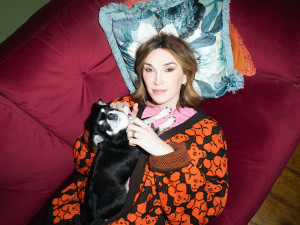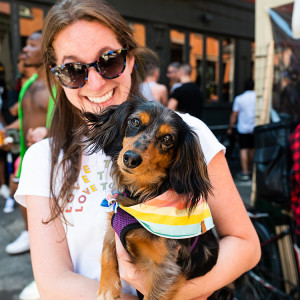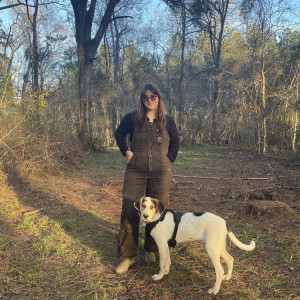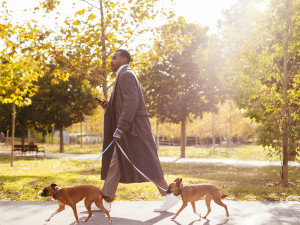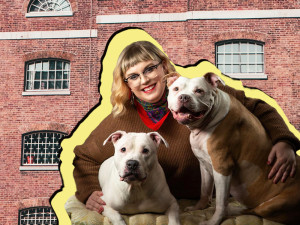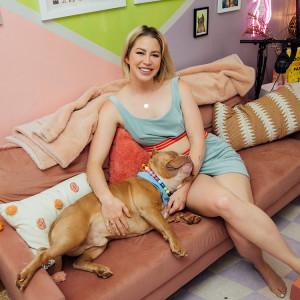For the Resident Pets of This Animal Sanctuary, There’s No Compromise on Happiness
Happiness Compromise Farm is a queer and trans-founded-and-run animal sanctuary with four-legged residents who “couldn’t care less how you identify.”
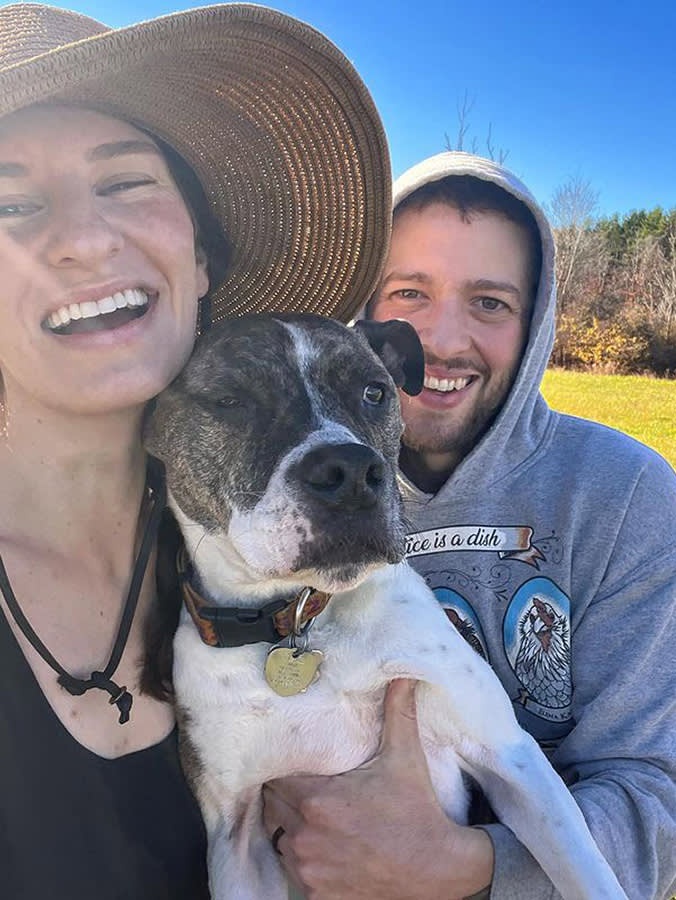
Share Article
As the calendar moved from May to June this year, and pride month was officially underway, Eryn Leavens had a decision to make. The executive director and co-founder of Happy Compromise Farm and Sanctuaryopens in a new tab, a nonprofit based in rural New York, was weighing whether it was safe to share a post on the sanctuary’s Instagram celebrating its identity as a queer and trans-founded-and-run organization.
With attacks on the LGBTQ+ community — particularly the trans community — on the rise, Leavens and her partner and co-founder, Oliver Gawlik, often have to balance the desire to be out and proud with ever-present safety concerns. “It is really scary because — especially with a public following — you’re really putting yourself out there,” Leavens says. “I stopped myself a few times while writing the post and asked myself: ‘Do I really want to come out and say Oliver is trans again?’ People know where to find us, and that is a fear.”
Above all, Leavens and Gawlik, who started their nonprofit in 2019, are dedicated to using the sanctuary as a means to create connection between humans, animals, and the planet and to “eradicate systems of oppression,” they say. The two met on an online dating app in 2017, when Gawlik was still an omnivore, and soon dedicated their lives to veganism and animal rescue.
The two moved to a farm in Oregon with just 11 animals, and quickly increased that number to 40 after inheriting many of the residents that already lived there. Now, on their new property in New York, they have more than 100 animals in their care, including ducks, chickens, alpacas, and cows. In addition to the traditional farm animals, they also care for rescued companion animals in their home including five dogs and two indoor cats. For Happy Compromise, centering the nonprofit as queer-run (and a safe space for people of all identities) is integral.
“If we weren’t so outspoken about it, I don’t think either of us would feel like we were doing as much as we could,” Leavens says. “And even if there are bad people who could see the post, there are also a lot of people that it could inspire and who need to see it. I need to see it. It is a risk, but it also would feel like a disservice if we didn’t take that risk.”
The two founders took a short break from their endless parade of chores, including feeding, cleaning, and giving medical care to the dozens of animals on their farm to chat with Kinship about their mission, what it means to be out and proud all year, and their favorite cuddly rescue Pit Bull, Fiona.
Could you start by just describing Happy Compromise farm for people who don’t know?
Eryn Leavens: Happy Compromise Farm and Sanctuary is a 501(c)(3) nonprofit where we rescue animals and grow plant-based food both for the residents here and for humans. We currently have more than 100 rescued farm and companion animals, all from hoarding, neglect, and slaughter situations.
Oliver Gawlik: We also have a free farm stand where anyone — neighbors, people in the community — can come and take anything they need for free. We advocate for everyone — animals and marginalized groups. Veganism for us is intersectional.
How did you arrive on this path of running an animal sanctuary, veganism, and all of the intersections that come with it?
OG: I was working as a chef and on track to become a butcher. I was going to open up my own whole-food farm where I provided meats, cheeses and veggies and fruits for folks. But I met Eryn in 2017, and she challenged me on [the topic of meat consumption]. I went from eating meat to being vegan in about a month’s time.
EL: We moved to Oregon in 2019 to start a small fruit, veggie, and flower farm. We had about 40 rescued animals at the time, but we weren’t focusing on animal rescue. But we immediately saw the need for homes for more rescue animals, so we kind of switched gears a little and began to really focus on it. Ultimately, we just fell into it. It wasn’t like we sought out thinking we wanted to start an animal sanctuary. It was more a realization that this work is needed, and we can’t keep doing it alone. So we need to actually form a legitimate organization in order to continue to help animals.
How does farming tie into the rest of the sustainability work that you do?
OG: It’s based on a belief that animals are an integral part of an ecosystem; they are needed in order to restore the soils and things like that. The question is: How do you farm responsibly and have animals be a part of it? How can we do that without exploiting them? So, by founding a nonprofit, we get to rescue animals, and then have them help heal the earth that we are caretaking for currently — and additionally grow food for humans.
Happy Compromise is obviously very much a joint project of yours and of your relationship. How did you two meet and build this life together? Did you both have dreams of having a farm?
EL: We met on OKCupid when we were both living on a little island in the Bay Area called Alameda. Even though we were pretty different, we just had a really strong bond from the start. We both wanted farms. I didn’t necessarily want a nonprofit animal sanctuary, but I definitely wanted to be able to provide a home for rescue animals. But Oliver wanted a farm where he was raising animals for food. So, for a while, our imaginary farms were very different — they were next door to each other because we were doing such different things. And when our relationship started getting serious, we were like, “OK, we can’t really have next-door farms; we need to figure out a way to do this together.”
You had to reach, well...a compromise!
OG: We had to ask ourselves, “Where’s the compromise?” and that’s the reason behind our name, Happy Compromise Farm.
EL: The name is a lot about our relationship and not as much about what we are doing here, but it does apply to the link between caring for animals and growing food. It’s all about how we’ve worked together and the compromises that we make every day in order to make this place run well.
Oliver, what does it mean to you to be out and open about being trans as someone in the farming world? There doesn’t seem to be a lot of trans farmer representation for people who are looking to be in that space.
OG: Absolutely. Rural America has a well-earned bad reputation for not being welcoming to marginalized communities, so having the sanctuary as a safe space for queer people is a big goal of mine.
My dream is to build out a tiny house on the property. I would love it if trans people could come out and learn how to farm, and if we became a hub for queer and trans people to come out and gain skills in farming, to have a safe space where they can experience the joys of working rurally and living rurally. It is really magical; it is really grounding and important to connecting with yourself. When I started to transition, I started working on farms. They always kind of go hand-in-hand for me. It’s always been a really safe place I can go when I’m not feeling [safe] otherwise.
EL: Animals couldn’t care less how you identify.
OG: Exactly, they just care if you have food.
I don’t know if this is a fair question to ask when you have more than 100 animals on the farm, but do you have any favorites?
OG: 100 percent. Mine is [one of our dogs] Fiona.
EL: Yes, Fi-fi. Also, oftentimes special needs animals end up being some of our favorites, simply because we’re spending so much time with them. There are other animals that we care for every day, but we’re not, like, spending tons of time with them because they’re just out living their best alpaca life or chicken life. We don’t make animals interact with us unless they want to. We’re just providing the space for them to live really great lives.
Can you tell me more about the indoor animals? What are your dogs’ names?
Eryn: We have five dogs, two indoor cats, and two outdoor barn cats. We have two rescued Greyhounds named Twyla and Tallulah and then three blockiesopens in a new tab, which is what we call the Pit Bull mixes, which are Fiona, Chuck, and Winnifred. They are two separate groups but coexist very well through their shared passion for sleep.
How was adopting a former racing dog different from adopting your other dogs? Were there any special considerations you had to make?
EL: It’s totally different, mostly because they’ve never really seen outside of a racetrack. Often, Greyhounds who are rescued have never seen a woman before because they only work with the male trainers. They’ve never walked up stairs, they’ve never had toys. They are scared of cars. Basically, they have never had any of the normal experiences of being a dog — even the experiences that a typical shelter dog would be used to. The whole world is new for them.
What’s it like rescuing Pit mixes?
OG: Pits are so stigmatizedopens in a new tab. The reputation opens in a new tabis that they’re scary, they’re mean. But [Fiona] is one of the cuddliest dogs I’ve ever met. Like with every dog, you don’t know what their history is when they come to you. You never know what you’re getting. So, you have to work with them and help them open up and thrive, and figure out what makes their life better. That’s the whole point of adopting themopens in a new tab, right? To give them a better life.
With Fiona, it was really tough. We think she was a street dogopens in a new tab before we got her, because she is always scavenging and eating anything she can find. She didn’t know how to communicate her needs without biting. So we trained her to deescalate: You can come to us at a calmer level, and when you do that you are going to get treats and snuggles and love — all the things she really wanted but didn’t know how to ask for.
It seems like you both have such big hearts, and I know there are inevitably more animals out there who need help than you can save. How do you balance that?
EL: A lot of people will say that the hardest part of running a rescue is saying no, because you get requests all the time and you just can’t help everyone. If you help everyone, it can very quickly get out of hand.
OG: A big pillar of our mission is to operate in a sustainable way, and that includes our time. A lot of sanctuaries can take in a lot more animals because of how they are structured. They can pay for people to haul off manure or haul in food. But then you end up operating in the same way as a traditional, confined animal-farming operation where resources are being taken out and being brought in and it’s not doing anything for the environment. For us, it is about making sure that everyone has a ton of space, and making sure that Eryn and I can still squeeze in about 15 minutes a day of free time.
You all are so mission-focused. Do you feel like you also have to deal with a broader grief over larger issues like climate change and the animal industry?
EL: For me, it’s two things. It’s knowing that dairy consumption has gone down more than 40 percent in the past few decades. Change is happening and younger people are making different decisions than our parents did. We’re doing everything we can to facilitate that change and introduce people to other options.
Connecting with the animals we have saved is also really helpful for that grief. If we have a hard day, we can come home and snuggle with the cows here we have saved from slaughter. Knowing that, whether it is one animal or a hundred animals, we have been able to make a difference in the lives of the animals we have saved is important.
OG: It’s important to remember that we’re just one small piece. We’re just two people doing what we can and trying to show others what they can do to help offset climate change. The best way to save animals is not by not saving every animal physically; it is by saving them and telling their stories — by getting people to make connections to the animals and then take those animals off their plates, take them off their backs, take them out of their drinks.
You all have been very outspoken on Instagram about being a queer-run business at a time when LGBTQ+ rights and particularly trans rights are under fire. Can you talk about why you post about that and what that means to you?
OG: I don’t see how we can separate it from what we do. For us, there are many facets of veganism. Yes, being vegan is for the animals, but it is also for the environment. It’s for health, and it’s for labor. Being part of a marginalized community as queer people, it doesn’t feel like much of a step out from our activism around veganism to also be activists for other marginalized communities.
I think of myself when I was young — baby trans Oliver at 18 or at 21 — I would have needed to see a 35-year-old trans man doing what I am doing now. It’s really important to show what’s possible.

Kari Paul
Kari Paul is a writer whose work has been published in the Guardian, the Wall Street Journal, and New York Magazine. She has had an endless march of more than 20 foster kittens, cats, and dogs over the last few years and always cries when they leave.
Related articles
![Juno Dawson on a couch with her Chihuahua, Prince]() opens in a new tab
opens in a new tabJuno Dawson and Her Dog Prince Think You Need to Chill
The author of the ninth-most banned book in the US finds joy in creating queer art and basking in the unconditional love of her Chihuahua.
![Black and tan dog wearing a rainbow scarf in a woman's arms at The Wildest Pride Parade]() opens in a new tab
opens in a new tabThe Dogist x Kinship March for Pride
Behold, the best-dressed pets at the 2022 NYC Pride March!
![A woman in the woods with her dog.]() opens in a new tab
opens in a new tabEstelle Lemmler and Hank Are Blissfully Living off the Land
The fashion designer turned sustainable farmer on trading city for country life, adopting a working dog, and harvesting farm-to-table treats.
![A well dressed man walking two dogs outside in a park.]() opens in a new tab
opens in a new tab5 Climate Developments That’ll Make Being an Eco-Friendly Pet Parent a Little Easier
From the next generation of upcycled treats to an actually helpful carbon counting app.
![Hiker and dog overlooking the top of a mountain]() opens in a new tab
opens in a new tab8 Ways to Be a More Eco-Friendly Pet Parent in 2025
Expert tips to help reduce your pet’s carbon footprint. (Pawprint? You get it.)
![My Pit Bull is Family]() opens in a new tab
opens in a new tab“My Pit Bull is Family” Fights For the Big Little Guys
The fair-housing org’s journey from bumper stickers to databases.
![Kelsey Darragh with her dog Hippo]() opens in a new tab
opens in a new tabKelsey Darragh’s Pit Bull, Hippo, Is Her True Soulmate
The filmmaker, comedian, and mental health advocate’s boyfriend didn’t want to adopt their foster pup. She ditched the guy and kept the dog.
